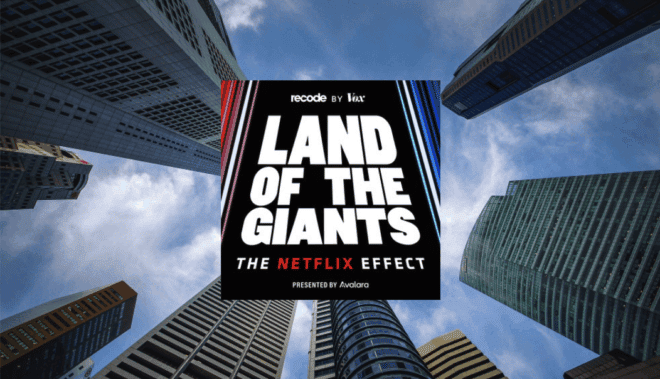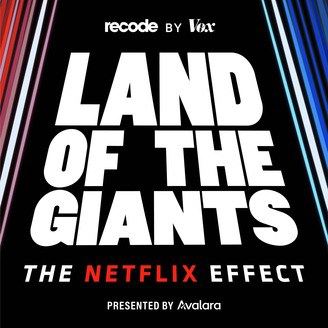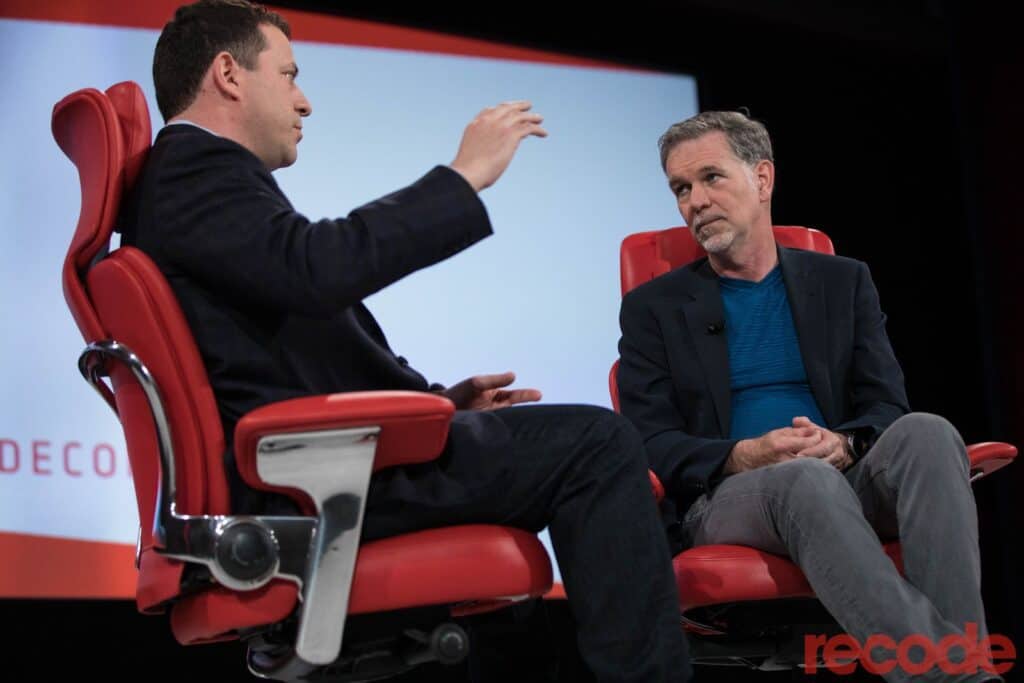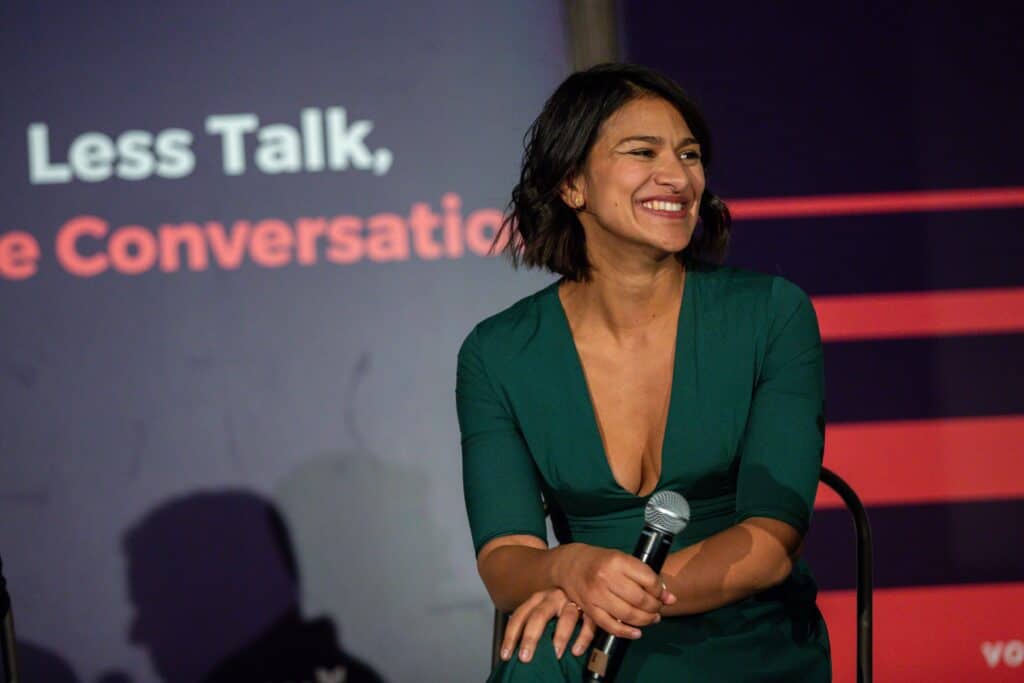Q&A With The Hosts Of The “Land Of The Giants” Podcast

Hosts Peter Kafka and Rani Molla dish on Season 2 called The Netflix Effect
Land Of The Giants podcast from the Vox Media Media Network and examines how the biggest tech companies rose to power, and what they’re doing with that power. In season one, The Rise of Amazon, Recode’s senior commerce correspondent Jason Del Rey traced how Jeff Bezos transformed Amazon from an online bookseller to one of the largest companies in the world, and what that means for how we shop, work, and live. From Prime and HQ2, to the growing adoption of smart speakers and home cameras, to increasing scrutiny of Amazon’s power and its role in the changing nature of work, Land of the Giants: The Rise of Amazon, addressed it all with detailed, thought-provoking, measured reporting from host Jason Del Rey. Season one ran from July 2019 until November 2019.

Now season two tackles the streaming giant Netflix. In this new season – The Netflix Effect — which began in late June, hosts Peter Kafka and Rani Molla examine how Netflix got where it is today and whether or not it can maintain its streaming supremacy. Hear from Netflix’s founders and top executives as well as its competitors, critics, and more — covering everything from its unusual internal culture to its battle with Blockbuster, its disruption of Hollywood, and the upcoming streaming wars.
Peter Kafka is the executive editor at Recode; host of Recode Media, the weekly podcast dedicated to the future of media and technology; and co-executive producer of Recode’s Code Conference, a premiere series that hosts hard-hitting interviews with the media and tech industry’s leading players.

Rani Molla is a senior data reporter at Recode covers business and technology news through charts, images, maps and sometimes even text. Before joining Recode, Rani was a data columnist at Bloomberg Gadfly and a visual reporter at The Wall Street Journal.

Peter and Rani sat down with Discover Pods to discuss this season of Land Of The Giants called The Netflix Effect.
Discover Pods: Was there any plan before season one about the order of Silicon Valley companies to be covered in which season?
A. Nishat Kurwa (VP and executive producer, audio, Vox Media): When we conceptualized the series, we did discuss plans for season order. That consideration included a look at which companies were having the most dramatic impact on our politics and culture, and hadn’t been explored comprehensively in audio. We also considered which companies we could start our in-depth reporting on right away, based on the expertise and insights of reporters and hosts across the company’s tech-focused editorial brands. And those early discussions have been useful to our long-term planning for this series, but we were also prepared to be nimble and pivot with the news: we certainly couldn’t have predicted back in January that explaining how Netflix became the dominant streamer would have been as timely as it is in our current moment.
Discover Pods: How did Vox and Recode join forces on this series?
Peter Kafka: We have already joined forces! Back in 2019.
Discover Pods: Jason Del Rey did a superb job on Amazon in season one. Did Peter and Rani begin their Netflix investigation while season one was still being produced?
Peter: We started after Jason had finished, or had just-about-finished, his series. Which was very helpful for us, so we could learn from him.
Discover Pods: Peter, you have more than 20 years of experience in covering the tech industry. Was this podcast like coming home to your roots?
Peter: It’s more like an extension of what I’ve been doing for a long time. But this time I was trying to figure out how to talk about/explain Netflix for a different audience, using a different medium. Which was a lot of fun.
Discover Pods: Rani, did your experience at Bloomberg as a data columnist and at the WSJ help you with the investigative journalism needed for The Netflix Effect?
Rani Molla: Diving through data and company filings certainly helped provide framework and context for the stories we told, but a podcast is such a different medium than text and visualizations. We had to be much more judicious in our use of numbers, so they didn’t become confusing or bog down the audio.
Discover Pods: How much did either of you know about Netflix? Its culture? Its history?
Peter: I met Reed Hastings way, way, way back when I was a junior staffer at Forbes magazine, and he was running this goofy DVD-by-mail business, and no one else at Forbes wanted to talk to him, so I did. So I’ve known about Netflix for some time, and covered them in a more serious and formal way for the last 10 years or so. But there was (and is) a ton for me to learn about them.
Rani: I didn’t know as much, so started off by reading lots of old news stories, as well as books by the co-founders, Reed Hastings and Marc Randolph, and also by early executive Patty McCord, who has since become something of an HR guru.
Discover Pods: How did you organize the episodes for the season?
Rani: The episodes are organized thematically, each covering a different topic we thought was important to the Netflix story. This isn’t a definitive history or anything like that.
Discover Pods: As you captured a more complete picture of Netflix during your investigation, did that mean adjustments in the podcast?
Rani: Yes! We were constantly moving sections around, cutting and adding as we learned more and talked with more people.
Discover Pods: Did the lockdown affect production or distribution of the podcast?
Peter: Production, for sure. We interviewed Reed Hastings and other executives in LA on March 5th, and that turned out to be the last time we interviewed anyone in person for this show; we’ve been doing the rest of it from our homes, with a few very quick pop-ins to the Vox office in NYC for some recordings.
I don’t know that it changes distribution, except that it’s probably harder to get people to listen to podcasts when they are at home.
Discover Pods: Peter & Rani, so far it seems that you have access to key people at Netflix in high positions. How much did the company cooperate with your efforts?
Peter: It was pretty straightforward: We told them what we were doing, and gave them a list of the people on their executive team that we’d like to interview, and they were pretty helpful about making them available.
Discover Pods: Rani, I heard that you just had a baby. Congratulations.
Rani: Thanks! He is a big fan of the show. He says everyone should subscribe.
Discover Pods: We were surprised that Netflix had its own lexicon. What was your reaction?
Rani: It’s not uncommon for people at tech companies to talk like they’re from another planet, but Netflix is certainly a more extreme version of this. That people at Netflix are so committed to using their extensive Netflix lexicon I think speaks to how serious they take their culture — or maybe how committed they are to the schtick.
Discover Pods: Like many successful (and unsuccessful companies) Netflix has a unique, high-performing company culture. What do both of you think about its unique culture? Is it a competitive advantage?
Peter: Rani and I would talk about this all the time. Parts of the culture seemed really unattractive to us, and not useful for lots of companies that aren’t stocked with type A personalities. And other parts — particularly their emphasis on candor and transparency — seemed very appealing. Netflix definitely believes it’s a competitive advantage, and because Netflix has done so well over the course of its history, it’s hard to argue otherwise. If the company had another extended rough patch, like it did in 2011, it would be interesting to see what that does to its internal perception.
Discover Pods: Do either of you think that Hastings could make the same mistake he did with Quikster in 2011-2012?
Peter: Yes. Humans are fallible. And while Hastings has more checks and balances preventing him from a big screw up, he could certainly do it. But the company is roughly 10x the size it was back then, so I think it’s also harder to make significant changes in any direction, for better or worse.
Discover Pods: What do you think would have happened if Blockbuster had actually purchased Netflix for $50 million as proposed? Do you think Blockbuster would still be out of business due to its arrogance and business nearsightedness?
Rani: I think it’s quite possible we’d have Blockbuster Originals and Blockbuster and Chill.
Discover Pods: What was the biggest challenge in putting together the pieces of this season? Script? Interviews? Audio? Editing? Organization?
Rani: We had a trawling approach to reporting, conducting interviews with everyone we could, so one of the bigger challenges was cutting everything down to fit what would become the seven main topics and episodes. Also, narrative podcasting was a new medium for both of us, so we had a lot to learn about what works there compared with written articles. The editing process is certainly longer and more complicated because our team is much bigger than just an editor and a writer.
Discover Pods: What are the key themes you both think listeners should pay particular attention to?
Rani: One important idea is whether Netflix is fundamentally different — in its culture, its business model, its tech savvy — than its competition and whether that gives them a competitive advantage.
Discover Pods: I’ve heard the first two episodes (terrific, by the way) so this question may be answered later in the season. How can Netflix continue to spend so much money on content creation for original programming and still make money as markets mature?
Peter: Great question! And yes, we will talk about it in our money episode.
Discover Pods: How do you think Netflix will fare in the battle of streaming services? What is its strength? Weaknesses?
Peter: Netflix has an *enormous* lead. Doesn’t mean it can’t squander it to rivals, but it is *way* farther ahead than everyone else. There’s a line of argument that says that once Disney, Fox, NBC et al take their shows away from Netflix that it will suffer but so far Netflix seems to be doing a good job of disproving that thesis. *If* the company can stay afloat financially (see above) it seems like they’ll be in very good shape.
*******************************************************
In the last few years, we’ve all discovered that enormous tech companies often decide how we communicate, how we interact with the world around us, how we think about the world and what we watch on our video devices.
The Land Of The Giants podcast investigates companies like Amazon and Netflix, explores their creation and creators, translates their unique culture for listeners and then evaluates how these giants impact us – sometimes to make our lives better and at times to make our lives more complicated.
Orchestrated in a command performance by hosts Peter Kafka and Rani Molla, Land Of The Giants treats listeners to a 360-degree surround sound of the hidden levers and buttons that transform Netflix’s distinctive corporate culture into a successful media and tech leviathan.













Comments
Comments are closed.